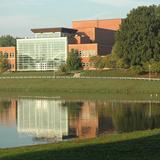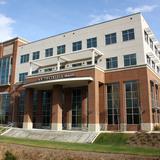- The mission of McDowell Technical Community College to provide high-quality, comprehensive educational opportunities and services which fulfill the personal development, training and employment needs of the residents, businesses, and industries in McDowell County and surrounding areas. The College acknowledges and values cultural, gender, racial, and ethnic diversity and seeks to contribute to the maximum development of the individual and community through open door admissions and readily accessible and affordable programs. The college is dedicated to providing quality educational programs and services accessible to students on-campus, off-campus, or through distance learning. These educational programs and services are offered, within the limits of a available resources, regardless of disability or previous educational attainments.
School Highlights
McDowell Technical Community College serves 1,498 students (23% of students are full-time).
The college's student-teacher ratio of 12:1 is lower than the state community college average of 13:1.
Minority enrollment is 26% of the student body (majority Hispanic), which is less than the state average of 48%.
Quick Facts (2025-26)
- Enrollment: 1,498 students
- In-state tuition: $1,776
- Out-state tuition: $6,384
- Acceptance Rate: 50%
- Student-teacher ratio: 12:1
- Minority enrollment: 26%
- Source: Integrated Postsecondary Education Data System (IPEDS)
Top Rankings
McDowell Technical Community College ranks among the top 20% of public schools in North Carolina for:
Category
Attribute
Affordability
School Overview
The teacher population of 126 teachers has stayed relatively flat over five years.
McDowell Technical Community College
(NC) Community College Avg.
Carnegie Classification
Associate's Colleges: Mixed Transfer/Career & Technical-High Nontraditional
Associate's Colleges: Mixed Transfer/Career & Technical-High Nontraditional
Institution Level
At least 2 but less than 4 years
At least 2 but less than 4 years
Institution Control
Public
Public
Year Founded
1967
Total Faculty
126 staff
256 staff
School Calendar
Student Body
The student population of McDowell Technical Community College has grown by 31% over five years.
The student-teacher ratio of 12:1 has increased from 8:1 over five years.
The McDowell Technical Community College diversity score of 0.44 is less than the state average of 0.66. The school's diversity has grown by 64% over five years.
Total Enrollment
1,498 students
2,579 students
Student-Teacher Ratio
12:1
13:1
# Full-Time Students
340 students
766 students
# Part-Time Students
1,158 students
1,813 students
# Enrollment Undergraduate
149 students
316 students
# Full-Time Undergraduate Students
340 students
766 students
# Full-Time Graduate Students
n/a
22 students
# Part-Time Undergraduate Students
1,158 students
1,990 students
# Part-Time Graduate Students
n/a
3 students
Total Dormitory Capacity
n/a
717 students
% American Indian/Alaskan
n/a
1%
% Asian
1%
3%
% Hispanic
9%
13%
% Black
5%
21%
% White
74%
52%
% Hawaiian
n/a
1%
% Two or more races
3%
3%
% Non Resident races
n/a
1%
% Unknown races
7%
5%
Diversity Score
0.44
0.66
College Completion Rate (Students who graduate in less than 4 years)
45%
37%
College Completion Rate (Students who graduate in 4 years or more than 4 years)
n/a
43%
Average Graduate Earnings (10 Years)
$25,900
$27,500
Tuition and Acceptance Rate
The public in-state tuition of $1,776 is less than the state average of $3,915. The in-state tuition has declined by 7% over four years.
The public out-state tuition of $6,384 is less than the state average of $9,508. The out-state tuition has stayed relatively flat over four years.
In-State Tuition Fees
$1,776
$3,915
Out-State Tuition Fees
$6,384
$9,508
% Students Receiving Some Financial Aid
83%
82%
Median Debt for Graduates
$4,634
$10,500
Median Debt for Dropouts
$6,500
$6,000
Acceptance Rate
50%
82%
SAT Reading
n/a
488
SAT Math
n/a
498
ACT Composite
n/a
20
ACT English
n/a
13
ACT Math
n/a
16
Source: 2024 (or latest year available) Integrated Postsecondary Education Data System (IPEDS) , School Administrators
School Notes
- School Mascot: Tigers
- In 1964, McDowell Technical Community College was established as the Marion-McDowell Industrial Education Center, located in downtown Marion, N.C. near the corner of State Street and South Garden Street. M-MIEC operated as a satellite unit of Asheville-Buncombe Technical Institute until September, 1967. The school moved to permanent facilities on a 31-acre site at the intersection of Interstate 40 and Highway 226 in Marion in 1970. Today, McDowell Technical Community College offers Associate Degrees, Diplomas, and/or Certificates in more than 30 curriculum programs. The College also offers classes in many areas of Continuing Education. MTCC currently serves more than 6,800 students per year with some type of education and training. The college offers a number of Occupational and Continuing Education Services, including Teleconference Workshops, Computer Training, and a variety of specialized programs designed to enhance an individual's employability, to help him or her learn a new career, to establish a pattern of growth and stability in business and industry, and to help individuals stay abreast of trends in their chosen field. McDowell Technical Community College is accredited by the Commission on Colleges of the Southern Association of Colleges and Schools to award certificates, diplomas, and associate degrees.
Frequently Asked Questions
How much does McDowell Technical Community College cost?
McDowell Technical Community College's tuition is approximately $1,776 for In-State students and $6,384 for Out-State students.
What is the acceptance rate of McDowell Technical Community College?
The acceptance rate of McDowell Technical Community College is 50%, which is lower than the state average of 82%.
What is McDowell Technical Community College's ranking?
McDowell Technical Community College ranks among the top 20% of community college in North Carolina for: Least expensive tuition.
Recent Articles

Community College Success Rates 2025: Outcomes & Trends
Updated 2025 analysis of community college success rates, completion, transfer, costs, enrollment, and strategies that shape student outcomes.

Community Colleges in 2025: Combating Stereotypes with Impact
Updated insights on how community colleges are dispelling myths, growing enrollment, and expanding pathways in 2025.

2025 FAFSA Changes Explained for Community College Students
A comprehensive guide to 2025 FAFSA changes, what community college students must know, new eligibility rules, timelines, and tips to maximize federal aid.











